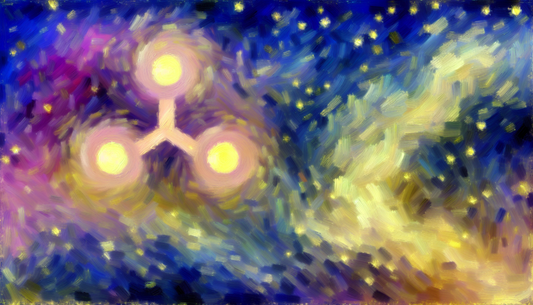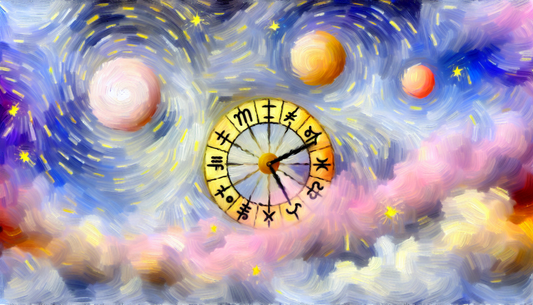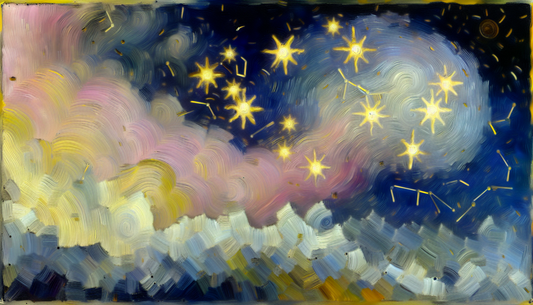Astrology has fascinated humanity for thousands of years, manifesting its influence across cultures and civilizations. As we delve into the depths of its history, we find that astrology is more than just a system of predictions; it explores humanity’s intrinsic relationship with the cosmos. Understanding this ancient practice begins with grasping its origins, which span from the early civilizations of Mesopotamia to the Renaissance, and now to our contemporary age.
The Birth of Astrology in Ancient Mesopotamia

Astrology's origins trace back to ancient Mesopotamia, around 2,400 BCE, when early astronomers began to observe the movements of celestial bodies. The Sumerians, Babylonians, and Assyrians took early steps in recording the positions of stars and planets, associating them with agricultural cycles and seasonal changes.
Around 1,800 BCE, the Babylonians developed the zodiac system, dividing the sky into twelve sections, each corresponding to different celestial bodies and mythologies. This system laid a foundation that would influence later astrological traditions, emphasizing the belief that the movement of the stars could predict earthly events and outcomes.
Egypt’s Contribution to Astrology

By the time we reach the 1st millennium BCE, astrology found a new home in ancient Egypt. The Egyptians were keen observers of the heavens and noted the symbolic significance of celestial patterns. They also introduced concepts of decans - 36 groups of stars used to time various moments of the day. Notably, the Egyptian pharaohs were often regarded as divine beings, and their authority was intricately linked to celestial predictions.
Interestingly, the Greek interest in astrology heavily borrowed from the Egyptians. Figures such as Ptolemy in the 2nd century CE synthesized Egyptian astrology, philosophical ideas, and Babylonian principles, thus creating a framework for what would later be known as Western astrology. Ptolemy’s influential work, the Tetrabiblos, laid the groundwork for astrological practices that would endure for centuries.
The Influence of Greek Philosophy
During the Hellenistic period, astrology underwent significant evolution as it assimilated various ideas from Greek philosophy. The Greeks approached astrology not merely as a predictive tool but as a philosophy of life interwoven with ideas of fate and free will.
Astrologers such as Hipparchus and later, Claudius Ptolemy, began to refine astrological techniques, such as house systems and aspects, which remain a central part of modern astrology. The Greek approach also emphasized the interpretative aspects of astrology, ensuring that individual experiences were aligned with cosmic events.
Astrology Across Cultures
Beyond the Greeks and Egyptians, astrology found its way into diverse cultures around the world, such as India, where Vedic astrology (Jyotish) rose, emphasizing the spiritual aspect of celestial bodies. Similarly, Chinese astrology, grounded in the twelve animal signs and elemental cycles, mirrored the cultural beliefs and practices of ancient China.
These variations enriched astrology, providing layers of interpretation that explored the symbolic and spiritual connections between humans and the universe. Astrology became a global practice, intermingling with religions, science, and philosophy while adapting to the unique beliefs of each culture.
Modern Context: Astrology in Today’s Society
Astrology has made a remarkable comeback in modern times, captivating a new generation. With the advent of the internet and social media, astrology has transitioned into a more accessible format, allowing enthusiasts to engage with it in ways that were not possible in earlier times.
Astrology is no longer confined to weekly horoscopes in newspapers. Instead, it has expanded into online platforms with comprehensive astrological software, apps, and personalized reports. The new age of astrology embraces inclusivity and self-exploration, welcoming diverse voices and interpretations.
Driven by individualism, many people now turn to astrology to better understand themselves and their relationships with others. From birth charts that detail personal celestial alignments to regular forecasts tailored to the current cosmic climate, astrology has become an intriguing tool for self-awareness and emotional insight.
Challenges and Skepticism
Despite its renewed popularity, astrology faces skepticism from critics who argue that it lacks scientific grounding. However, proponents assert that astrology serves more as a reflective tool than a deterministic one. It offers insights into personality traits and emotional dispositions, helping individuals navigate personal challenges.
The discussion around astrology often oscillates between the traditional perspectives that view it as sacred knowledge and contemporary interpretations grounded in therapeutic practices. As interest grows, so do discussions around its ethics, especially concerning the mental health implications of astrological advice.
The Future of Astrology
The evolution of astrology suggests a future filled with renewed exploration, integrating technology, psychology, and spirituality. With ongoing research and artistic expression in the form of astrology reading, workshops, and even fashion, the practice continues to adapt and inspire.
Astrology also stands as a piece of human history - a bridge connecting ancient civilizations with modern individuals searching for meaning in an increasingly complex world.
Whether viewed as art, science, or spiritual practice, astrology unmistakably remains a compelling, ever-evolving narrative of humanity's quest to understand its place in the universe. Thus, as we gaze at the night sky, we are reminded that we are part of something far greater, dancing to the rhythms of the cosmos that have echoed through time.















